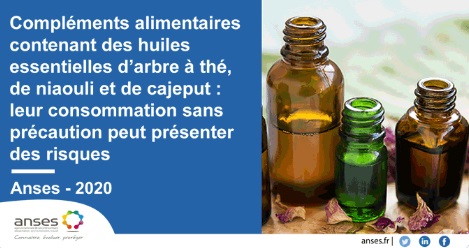
News of 12/16/2020
(Auto-translated from French)
While there is no traditional food use for Melaleuca leaves in France, essential oils present in many food supplements are derived from them: tea tree, niaouli and cajeput. Consumers are altering their use to make adjunct treatments for certain infections. However, these essential oils are not recommended and are even prohibited in certain European countries because of their potential neurotoxic effects.
ANSES was therefore asked to study the risks associated with the ingestion of these and confirms that:
According to the current state of knowledge, the oral absorption of certain compounds of the essential oils of Melaleuca (niaouli and cajeput) presents neurological , carcinogenic, genotoxic and potentially reprotoxic risks.
To avoid these risks, the Agency formulated recommendations on the preservation, dosage, avoidance or even ban of these essential oils. In particular, it advises against their consumption for children and pregnant or breastfeeding women.
The essential oils of tea tree, (from the leaves of different species of Melaleuca, niaouli and cajeput) are used in the composition of many food supplements. The antimicrobial properties claimed in aromatherapy books lead consumers to divert the uses of these food supplements to be used as additional treatments to treat certain infections (tonsillits, sinusitis, cystitis, etc.).
As the restrictions governing the use of food supplements are not harmonized at European level, the authorization of Melaleuca essential oils in food supplements varies from country to country .
These are, for example, authorized in Italy but prohibited in Belgium.
In this context, ANSES was asked to study the risk of Melaleuca essential oils in food supplements and the conditions most likely to guarantee their safety for the consumer.
Essential oils of tea tree, niaouli and cajeput; a health risk depending on several factors.
In its expert appraisal, ANSES identified several substances of concern contained in essential oils of tea tree, niaouli and cajeput:
For tea tree:
• terpinen-4-ol, the major component has a testicular toxicity in rats
•methyl eugenol, a substance present in very small quantities, but considered genotoxic and carcinogenic to humans
•ascaridole, a néoformée substance that appears if the essential oil is not properly maintained and whose toxicity is not well documented.
For niaouli and cajeput: 1,8-cineole is the major component that has caused neurological complications in children. It is also present in essential tea tree oils but at lower concentrations.
The results of the investigation show that:
•For tea tree, the health risk associated with terpinen-4-ol and methyl eugenol depends on the contents of these compounds in essential oils, the number of drops consumed, the size of the drops delivered by the dropper bottles, and the consumer’s body weight. Uncertainties remain about the toxicity of ascaridole and its presence in products on the market.
•For niaouli and cajeput: data on 1,8-cineole are insufficient and do not allow a level of exposure to be defined without risk for the consumer.
Storage, dosage, elimination, prohibition: ANSES formulates recommendations for the consumption of the various essential oils of Melaleuca
For essential oils extracted from Melaleuca and consumed orally:
•For essential tea tree oil, ANSES recommends that operators determine the maximum number of drops to consume per day, (taking into account the contents of terpinen-4-ol and methyl eugenol in these essential oils), the size of the drops delivered by the vials, and the consumer’s body weight. In addition, to prevent the formation of ascaridole, the consumer must be informed of the need to store essential oils of tea tree in a cool and dark place.
•For essential oils of niaouli and cajeput rich in 1,8-cineole, ANSES recommends prohibiting their oral consumption in children under 30 months and in children with a history of epilepsy or febrile convulsions, while awaiting more precise toxicological data.
Finally, for children, pregnant or breastfeeding women, ANSES underlines the absence of specific data relating to the risks associated with the consumption of these three essential oils orally and advises against their consumption .
•For the consumption of food supplements in general:
ANSES reminds consumers that food supplements are not medicines and that i should not be consumed as such. ANSES stresses the importance of:
-discuss with a health professional the relevance of consuming a food supplement in view of their state of health;
-avoid the concomitant consumption of several food supplements;
-report the consumption of food supplements and concomitant drug treatments to your doctor or pharmacist, because of the risk of interaction.
Finally, ANSES reminds healthcare professionals and manufacturers of the need to report any adverse effects likely to be linked to the consumption of food supplements to its nutrivigilance system.
Source: https://tinyurl.com/y8ysqogh

Added note by EMFSA
We are concerned that the consumption and absorption of essential oils (as described above) may contribute together with electromagnetic radiation to adverse health effects, especially neurological and multiple chemical sensitivity symptoms.
